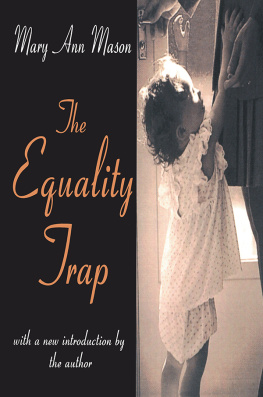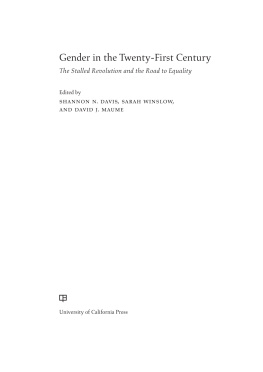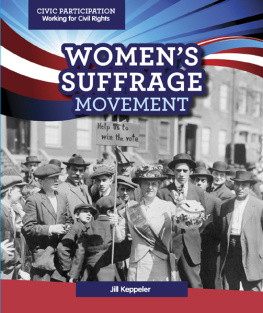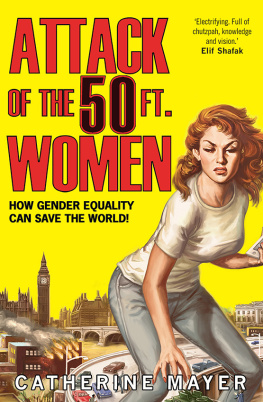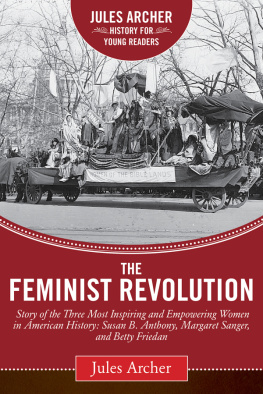The Stalled Revolution
Is equality for women an impossible dream?
By
Eva Tutchell
John Edmonds
United Kingdom North America Japan
India Malaysia China
Emerald Publishing Limited
Howard House, Wagon Lane, Bingley BD16 1WA, UK
First edition 2018
Copyright 2018 Emerald Publishing Limited
Reprints and permissions service
Contact:
No part of this book may be reproduced, stored in a retrieval system, transmitted in any form or by any means electronic, mechanical, photocopying, recording or otherwise without either the prior written permission of the publisher or a licence permitting restricted copying issued in the UK by The Copyright Licensing Agency and in the USA by The Copyright Clearance Center. Any opinions expressed in the chapters are those of the authors. Whilst Emerald makes every effort to ensure the quality and accuracy of its content, Emerald makes no representation implied or otherwise, as to the chapters suitability and application and disclaims any warranties, express or implied, to their use.
British Library Cataloguing in Publication Data
A catalogue record for this book is available from the British Library
ISBN: 978-1-78714-602-0 (Print)
ISBN: 978-1-78714-601-3 (Online)
ISBN: 978-1-78714-990-8 (Epub)
CONTENTS
ACKNOWLEDGEMENTS
When Sheila Rowbotham first decided that there should be a womens liberation conference in 1970, her intention was to put women back into history.
At this time of anniversaries, The Stalled Revolution is a tribute to the women who made Britain a better place. We record their struggles and we celebrate their victories.
In the course of writing our book, we interviewed many people and talked informally with several others. All were helpful, informative and encouraging. We are extremely grateful for their support.
In particular we wish to thank:
Marie Bailey, Pauline Barrie, Kim Beat, Karen Butler, Bea Campbell, David Charles, Miriam David, Jo Delaney, Carole Easton, Richard Ennals, Jane Everton, Heather Fallows, Christopher Forster, Sophie Gilpin, Philip Hedley, Jack Hodgkinson, Ashleigh James, Annabel Jones, Susanna Jones, Glenys Kinnock, Katie Learmonth, Deborah Mattinson, Paul Miller, Charlotte Proudman Ricky Romain, Elizabeth Roberts, Sheila Rowbotham, Lynne Segal, Sam Smethers, Hazel Taylor, Ann Traynor, Suzy Tutchell, Sarah Veale, and David and Jane Whitworth.
Colleagues and friends also kindly read and commented on sections of the book and we thank them for giving their time so willingly: Marianne Coleman, Jayne Grant, Beatriz Lees, Margaret Littlewood, Jane Miller and Liz Nichols.
In the following pages we record many extraordinary women. We dedicate our book to them and to the thousands more whose names may be forgotten by history but whose achievements illuminate our lives.
1
The Two Great Anniversaries
In the spring of 2017, the government agreed to erect a statue of Millicent Fawcett in Parliament Square.
The decision was well reported but many newspapers evidently did not expect their readers to know much about Millicent Fawcett. One newspaper ran the headline:
Who was Millicent Fawcett, the woman behind Parliament Squares first female statue?
The statue has considerable symbolic significance. It marks the hundredth anniversary of one of the most important events of the twentieth century. On 6 February 1918, the Royal Assent was granted to the Act that allowed women to vote in parliamentary elections. Later in that year over 8 million women voted for the first time in a General Election.
Millicent Fawcett led the Votes for Women campaign for nearly 30 years. In 1918 she and her allies won a glorious victory and, at the time, she was one of the most famous women in Britain.
But her fame has not lasted.
Emmeline Pankhurst, the other great leader of the campaign to secure votes for women, is rather better known.have heard of the suffragettes, whom she led, but they know very little about the nature of their struggle. When the film, Suffragette, was shown in 2015, the prejudice shown by the British establishment and the hardship suffered by the campaigners caused gasps in many cinemas.
This lack of knowledge is extraordinary. The campaign by women to secure the right to vote in parliamentary elections is one of the most momentous and inspiring stories of the last two hundred years. It changed the status of women in Britain and has a profound effect on the way we live today. Yet most people know less about the Votes for Women campaign than the marriages of Henry VIII.
The Second Anniversary
The year 2018 should also be commemorated for a second anniversary. It marks fifty years since the beginning of the great upsurge of feminist feeling that came to be known as the Womens Liberation Movement.
The pioneers of the Womens Liberation Movement have no statues to record their achievements and, although many of these pioneering women are still alive, they are even less well known than Millicent Fawcett and Emmeline Pankhurst. This is partly the result of modesty. The Womens Liberation Movement was self-consciously egalitarian. It elected no leaders and rejected the cult of personality. But its achievements are all around us.
The Womens Liberation Movement inspired the two great Acts of Parliament that were passed in the 1970s: the Equal Pay Act and the Sex Discrimination Act. Britain is far from being an equal society but many of the opportunities enjoyed by twenty-first century women can be traced back to the efforts of the Womens Liberation Movement.
The movement aimed to transform the way women were regarded and treated. Changes in popular culture illustrate the extent of the Movements influence Pictures of nude women were taken down from workplace walls, the so-called Beauty Contests lost their popularity and eventually even the Benny Hill Show, with its cohort of young women squealing as most of their clothes were accidentally removed, eventually disappeared from our television screens.
Surprisingly, the work of the Womens Liberation Movement has fallen out of the popular consciousness. There appears to be an assumption that these changes in the role and status of women just arrived automatically as a matter of course. This is a dangerous piece of mythology. If we do not recognise the significance of the campaigns that won these important victories, we may delude ourselves into thinking that further improvements will come without effort.
There is also the need to establish a proper balance to the recollection of British history. It was said by a writer in The New Yorker, and repeated many times since, that the womens movement was the most successful revolution of the twentieth century. Yet it is scarcely celebrated in this country. Indeed, unless they happen to sit on the throne, the achievements of women scarcely feature in popular accounts of our history. The coincidence of the two great anniversaries gives us an opportunity to restore these great victories, and the women who won them, to their proper place in the collective memory of Britain.


